Thursday, August 31, 2006
Nova Local's Personnel:
PHIL LAMBETH gtr
BILL LEVASSEUR drms
JOE MENDYK ld gtr
JIM OPTON bs
CAM SCHINHAN organ
RANDY WINBURN gtr
ALBUM: 1(A) NOVA I (Decca DL 74977) 1967
NB: (1) issued on MCA (MUPS 377) 1969 in the UK.
45s: 1 Games/If You Only Had The Time (Decca 32138) 1967 2 Other Girls/John Knight's Body (I Wanna Get Out) (Decca 32194) 1967
This band were students at University of North Carolina in Chapel Hill. Their album, which was recorded in New York in December 1966, is definitely worth investigating and is a minor collectable. Its very Anglophile sound garnered it a U.K. release, although the band had split by April 1967.
Bassist Jim Opton told U-Spaces:- "We were a band that was making a pretty good living playing fraternity parties around the campus, and a few cellar clubs in Chapel Hill. My fraternity, Phi Mu Alpha, was sponsoring a charity concert for our scholarship fund, and we decided to go for broke that year and book a big name. We contacted William Morris Agency in New York, and booked Chad and Jeremy. We needed an opening act, so I booked my own band... got us real cheap. The deal was that Rob Heller, who was with the Morris Agency would come and hear us play. He signed us immedately after the concert. A week later he hooked us up with Elliot Mazer, who became our producer. Elliot also worked as a song peddler for E.B. Marks Music, who published the music. We got a recording contract with Decca, I don't know how, but Rob put that deal together with Elliot, and the next thing I know, we are in the studio with all kinds of famous people that had us in awe for the first 35 seconds or so. I do know that somebody thought we were kind of special, because the studio was absolutely closed to visitors while we were there, and we were not allowed to take home raw tape to play for anyone. We did a lot of things that were pretty advanced for our time. Listen carefully to Morning Dew for example. The strange vocal effects were done by feeding the vocals through a Leslie Tone Cabinet from a Hammond B3. Also, the bass lead is the first bass feedback lead I think I can remember in a rock song. I blew up the amp doing it!! Cost me $750 (a LOT of money I didn't have in 1966)!! But, it was a hell of a lick. The album was essentially recorded by five of us: Randy, Bill, Joe, Cam and me. Phil had departed for law school. I believe he is alive and well, and practicing law in Charlotte, N.C."
"Actually, there is one little piece or two of rock and roll history that goes with that album. It was the first ever recorded using the very new, and relatively unknown, Dolby NR System. It took up a good size room at the time. The engineer for the album, Fred Catero, was also the engineer for Simon and Garfunkel."
Joe Mendyk had earlier played in Tri-Power, The Better Days and The Warlocks (with an excellent 45 on Decca). The 'A' side of their first 45, excellent harmony pop-punk, can be heard on Echoes In Time, Vol. 2 (LP) and Echoes In Time Vol's 1 & 2 (CD), the flip is on the album. Forgotten Man, also from the album, has resurfaced on Baubles - Down To Middle Earth (LP).
(Vernon Joynson / Max Waller)
Wednesday, August 30, 2006
ANANDA SHANKAR-And His Music (1975)

What a marvellous exotic album!
Shankar and his Music, by - you guessed it - Ananda Shankar.
Ananda Shankar was Ravi Shankar's Nephew and was one of the first
musicians to mix Indian music with western pop styles back in the
1960s.
Ananda Shankar and his Music expertly mixes 70s funky grooves with
Sitar and Indian instruments. Along with the
fantastic up-tempo numbers, we also get treated to a few lovely tracks
that are more on the chilled side.
Ananda Shankar & his Music became legendary in the 1990s simply
because Capitol picked "Streets of Calcutta" and "Dancing Drums"
for a Blue Note break-beat compilation.
But there is plenty more material of the same caliber, even on that album.
Ananda Sankar (1942 – 1999)

In the late 1960s Shankar travelled to Los Angeles, where he played
with many contemporary musicians including Jimi Hendrix. There he was
signed to Reprise Records and released his first self-titled album in
1970, featuring original Indian classical material alongside
sitar-based cover versions of popular hits such as The Rolling Stones'
Jumpin' Jack Flash and The Doors' Light My Fire. This album has become
an enduring cult classic.
After working in India during the late 1970s and 1980s, Shankar's
profile in the West began to rise again in the mid-1990s as his music
found its way into club DJ sets, particularly in London. His music was
brought to a wider audience with the release of Blue Note Records'
popular 1996 rare groove compilation album, Blue Juice Vol. 1.,
featuring the two standout tracks from Ananda Shankar And His Music,
"Dancing Drums" and "Streets Of Calcutta".
In the late 1990s Shankar worked and toured in the United Kingdom with
London DJ State Of Bengal and others, a collaboration that would
result in the Walking On album, featuring Shankar's trademark sitar
soundscapes mixed with breakbeat and hip hop. Walking On was released
in 2000 after Shankar's sudden death from heart failure the year
before.
To most people, "India's greatest musician" means Pandit Ravi Shankar,
whose ragas briefly pacified the world in the tumultuous 1960s. And
there are those who say Ravi's wife was better than he. But it was
Ravi's nephew Ananda who became the voice of modern India in all its
contrasting elements. In ways never previously imagined --much less
executed even by other master musicians-- he alone merged Indian and
western, classical and rock, lyrical and funky, exotic and commercial,
traditional and progressive. Given the enormity of the task and the
sharp contrast between his success and the failures of so many "raga
rock" practitioners, Ananda Shankar can be seen as one of the greatest
musical figures of the twentieth century.
The son of famous arranger-choreographer Uday Shankar & dancer Amala,
Ananda had all of the expertise, talent, and perfectionists'
dedication of the previous generation. He studied five years under Dr.
Lalmani Misra, head of the Department of Music at Benaras Hindu
University; following his intense tutelage, he spent two years abroad,
where he studied western classical and pop as well as multi-media.
While his ability to perform and compose rivalled that of his famous
father and uncle, he identified more with his own generation.
His 1970 debut album on Reprise featured covers of tunes by the
Rolling Stones and the Doors as well as his own (better) music. The
album's success led to an expansion of his orchestra including dancers
and multi-media effects. His wife Tanusree choreographed. After his
first Indian LP was released, Ananda's music became a fixture on
radio, television, and in theatre. Airlines, fashion shows, and the
film industry recognized his as the modern sound of India. Even years
after his death, his music can be heard at least on U.S. radio and in
fashion shows, thanks largely to a reissue and a compilation.
Ananda was the great modernizer of Indian music, as influential as
Mighty Sparrow and Kui Lee were in updating and promoting their
respective traditions. He won the Indian equivalent of a Grammy Award
for the score of "Chorus" in 1974. Other soundtracks featuring his
work may have been released in India. Throughout his career, his sound
remained fairly consistent, and his vision never flagged until his
untimely death. Yet India and the world still have not completely
caught on to his talent and significance.
Ananda Shankar & his Music became legendary in the 1990s simply
because Capitol picked "Streets of Calcutta" and "Dancing Drums" for a
Blue Note break-beat compilation. But there is plenty more material of
the same caliber, even on that album. Later, rarer albums yield even
more impressive music, and there are plenty of tracks waiting to be
discovered and played by adventurous DJs. Sa-Re-Ga Machan, a funky,
strange, and exotic madhouse ("Jungle King" even reprises "Streets of
Calcutta" a bit), may be the true masterpiece.
The beat of the tabla is as vital to Indian music as the conga to
African and Latin. While the Moog, sitar, and Western themes
distinguish Shankar's music as fresh and original, the cacaphony of
tabla beats grounds the music in simmering Bombay, timeless ragas, and
the splendor of Shankar musical royalty. In other places, such as the
Missing You tribute to Uday, Ananda uses vibes and flute to great
effect. And still elsewhere the elements of Indian soundtracks, such
as occasional female voice and strings, add power and excitement.
Call it futuristic exoticism or Indian soul music. Like other examples
of the best revolutionary music, the wonders of Ananda Shankar will
sound forever ahead of their time: definitely far out, and yet as
familiar and comforting as Mom's cooking.
grab and enjoy it !!!
Monday, August 28, 2006
(Canadian psychedelia)

RICK ASTON (bass),
JED MacKAY (organ, piano),
RICK McKIM (drums),
WAYNE ROWORTH (guitar)
NORM WHITE (guitar)
This package is an excellent example of early 70's keyboard-dominated psychedelia, garage punk, and haunting keyboard sounds.The sound of this reissue has been digitally remastered and for the most part it appears to have been taken from a vinyl source as there is an occasional vinyl static in places. Overall the sound quality is fairly good. Considering the rarity of the original "It's All Meat" album this release is welcomed by any fan of the early 70's garage and psychedelic sounds.
Sunday, August 27, 2006
(Havoc records,HJH 2)

SIDE 1 :
1. Love Won't Stop (R.Van Leeuwen)
2. I've Waited So Long (R.Van Leeuwen)
3. I'll Follow The Sun (R.Van Leeuwen)
4. The Girl From New York City (J.Taylor)
5. You Bother Me (R.Van Leeuwen)
6. I Want Someone Love (R.Van Leeuwen)
SIDE 2:
1. It's Gone (R.Van Leeuwen)
2. No matter Where You Run (R.Van Leeuwen)
3. Be The Woman I Need (R.Van Leeuwen)
4. I've Got Misery (R.Van Leeuwen)
5. Who'll Save My Soul (R.Van Leeuwen)
6. For Another Man (R.Van Leeuwen)
Great debut LP of the dutch Motions featuring future Shocking Blue guy Robbie van Leeuwen.
Included mix of beat, garage and moody tunes that consist of one of the superb albums in all over the world 60's music area !
Although the group disbanded in 1971, the most imporant members have met each other again and again in new groups such as Crossroad, Greenhorn, Jupiter and Galaxy Lin.
From 1964 till 1967, the line-up remained the same: Rudy Bennett (i.r.l. Ruud van de Berg - vocals, earlier as Ritchie Clark and the Ricochets), Robbie van Leeuwen (guitar, ex-Atmospheres & Ricochets, later the founder of both Shocking Blue and Galaxy Lin), Henk Smitskamp (bass, ex-Willy & Giants, later to Livin' Blues) & Sieb Warner (drums, ex-Ricochets, later to Golden Earrings).
In 1967, Robbie left to form Shocking Blue and was replaced by Leo Bennink (ex-Mack); Henk was replaced by Gerard Romeyn (ex-Tee-Set, later with Nico Haak, Image), who, in turn, was replaced by Paul van Melzen (ex-Haigs, later in the Mailer McKenzie Band) after just six months. The last line-up of the group (up 'til 1971) was: Rudy, Leo, Jan Vennik (sax, flute & organ, ex-Jayjays, later to Rob Hoeke & Ekseption), Han Cooper (organ, bass & vocals, ex-Bobby Green Selection, later with Leo, to Fisher & Friends) and Bobby Green (drums, ex-Bobby Green Selection, also to Fisher & Friends).
After the breakup, Rudy Bennett, Bobby Green & Gerard Romeyn all released solo singles.
This vinyl ripped by Optical Sound in bitrate of 256
grab and enjoy it !!!
LOS PEYOTES- Cavernvcolas (2006)
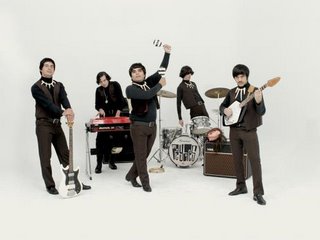
Oscar Hechomierda: bajo y coros
Pablo Peyote: baterνa y coros
Quique Melena: teclados
Rolando Bruno: guitarra y coros
1.I caverman and you?
2.Fuego
3.Cry baby
4.Mocker
5.Satanic rite
6.El humo te hace mal
7.When I arrive
8.Jack the ripper
9.Te pegaré
10.The brotherhood
11.I don't mind
12.The Witch + bonus track Scream
Psychotic Reaction, 2002
Sudamerican Garage Punk (EP), 2003
Cavernvcolas, 2006
Saturday, August 26, 2006
On a grim Friday evening in November 1983 the weekend is once more beginning with Channel Four's legendary Tube. Jools Holland pauses on the threshold of a public lavatory and says "...and now Indians in Moscow." Is this some hip new expression along the lines of "Once in a blue moon"? Well, no. A music video explodes onto the screen - a psychotic blonde singing a gruesome ditty about killing and eating her father to the backing of a crazed synth-punk calypso. Indians in Moscow have entered the building...
Over the next nine months this Hull band would repeatedly mug the music business, culminating in a storming gig at the Camden Palace in August 1984, before abruptly splitting up on the brink of fame and fortune. If they had continued, who knows what shape mid-to-late eighties music would have had?
Get It Here
BIRDMEN OF ALKATRAZ - From The Birdcage (1989)
(Neopsych Italian Group)
Track List :
1. puzzle of a downfall child
2.beggar girl
3.codeine
4.April dancer
5.lord of flies
6.harshness day
7.jack o' diamonds
8.birdcage
9.anxious colour
10.sea of shadows
11.a musical tribute
Group Members:
Stefano Magni - g
Daniele Caputo - voc, dr, perc
(Standarte, London Underground) Francesco Bocciardi - g
Gianfranco Migliaccio - b
Discography :
Glidin' Off (1987 EP)
From The Birdcage (1989 LP)
Excellent Italian 80s neo psychedelia. They create a very full sound with vibrant guitar buzzing, stinging and generally pervading every inch of precious vinyl. This record could easily be mistaken for the out-pourings of some time-shrouded acid crazed combo of the late 60's although some songs like "sea of shadows" betray their 80s roots...
Your Download-Link
Edip Akbayram (Great 2CD Compilation )
This release includes the best psych tracks from his first two albums and many singles -- 22 tracks, 90 minutes of music.
His band Dostlar formed the songs into something which takes you on an Eastern trip, full of fuzz guitar, electric sax and great percussions.
Edip's dark voice makes you shiver and you feel like dancing right away. This is as good as Erkin Koray -- deeply spiritual and charged with politically powerful lyrics.
This release stands as one of the Shadoks reissue classics.
Track Listings
Disc : 1
1. Ince Ince Bir Kar Yagar (Little Snowflakes Falling)
2. Deniz Üstü Kopürür (Spraying Ocean)
3. Gam Üstüne Gam Yapilir (Sorrow and More Sorrow)
4. Degmen Benim Gamli Yasli Gönlüme (Don't Touch My Sad Soul)
5. Anam Aglar Bas Ucumda Oturur (Mother Cries About Me at the Head of My B)
6. Bosu Bosuna (In Vain)
7. Garip (Miserable)
8. Yakar Inceden Inceden (It Burns)
9. Daglar Dagladi Beni (The Mountains Made Me Sad)
10. Dumanli Dumanli Oy Bizim Eller (Our Village Is Full of Smoke)
11. Sev Beni Beni (Love Me)
12. Kükredi Cimenler (Roaring Grasses)
Disc: 2
1. Kolum Nerden Aldin Zinciri (My Arm, Where Do You Got the Bracelet From)
2. Aldirma Gönül (Don't Bother My Soul)
3. Kaslarin Karasina [Your Black Eyebrows]
4. Arabam Kaldi Yolda (My Car Broke Down)
5. Affetmen Seni (I Will Not Forgive You)
6. Adam Olmak Dile Kolay (To Be a Man Is Easy to Speak)
7. Dar Agaci (Gallows Pole)
8. Mehmet Emmi (Uncle Mehmet)
9. Haberin Varmi (Do You Know?)
10. Zalim (Tyrant)
11. Ayrilik (Separation)
12. Birak Beno (Let Go of Me)
Glad tidings for Turkish psych freaks, or those soon to become Turkish psych freaks (just give this a listen!): here's a new must-have collection crammed full of swirling, fuzzed-out electric saz, impassioned vocals, and traditional Turkish folk gone funk! If you are indeed into the groovy East-meets-West psychedelia that flourished in Istanbul back in the '60s and '70s, artists like Mogollar, 3 Hur-el, Baris Manco, and Erkin Koray, chances are you may already be familiar with Edip Akbayram and his band Dostlar (formed in '73). This new Edip Akbayram double disc on the Shadoks label contains 24 tracks, including ten of the 14 cuts found on that previous reissue (meaning, if you already have that cd, you still will want this for the whole disc and then some of songs you don't have... and you can't get rid of the Nedir reissue either if you want those four songs that don't overlap). So this is definitely the Edip set to get at any rate.
The colorful music of Edip Akbayram and Dostlar is pretty much the hardest-rockin' all the Turkish psych acts of the era I've heard...darn heavy in spots. The Anatolian folk-rock of the sixties is blended with a polyester '70s wah-wah funked-up progginess here. It's vibrant and colorful music to make you feel like you're in some smoky, swinging nightclub on one of the warren of narrow, twisting side-streets off of the hip main drag Istiklal in the Beyoglu neighborhood of Istanbul, back in the day, sweating on the dance floor or sitting back, sucking on a hookah.
The cd booklet is full of cool photos, and a page of liner notes, giving Edip's bio but no info on the tracks themselves, I'm just told that they're from his first two albums and singles. However, they do include English translations of the song titles, which should give some idea of Edip's seemingly dire outlook on life (or the outlook shared by his Turkish folk sources), with such songs as "Sorrow And More Sorrow", "Miserable", "In Vain", "Our Village Is Full Of Smoke", "Don't Touch My Sad Soul", "Tyrant", "Gallows Pole" and even "My Car Broke Down"! Sounds like a bummer, yet many of these tracks are amazingly upbeat musically!
Edip definitely belongs high up in the reissued ranks of all the incredible, obscure, groovy sixties/seventies psych sounds from all around the world that I can't get enough of: Os Mutantes, San Ul Lim, Mogollar, Blo, Bango, Brincos, Krysztof Klenzon, Juan de la Cruz, Los Dug Dugs, He 6, the stuff on comps like Cherrystones Rocks, Welsh Rare Beat, Prog Is Not A Four Letter Word, Studio One Funk, etc. etc. etc.
Enjoy !
Edip_Akbayram_Disc_1.rar
Edip_Akbayram_Disc_2.rar
Friday, August 25, 2006
HUMAN EXPRESSION-Love At Psychedelic Velocity
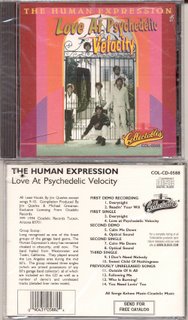
GREAT 60' PSYCH GARAGE BAND !
Because of their masterpiece track that called "Optical Sound",
I choose my user name.
Of course included it in this album (CD), as all their fantastic singles that issued in decate of 60's (4 singles in total).
All Humans Expression's singles (a & b sides) are great garage/psychedelic tunes !!
However, in 1994 the Collectables records, released an CD ''Love At Psychedelic Velocity'', which compiles all the band's singles, plus demos and four post-Human Expression solo tracks cut by Jim Quarles. The CD also includes excellent liner notes, from which this entry has largely been taken, and is recommended to fans of the band.
Unfortunately for me, till now there is any vynil re-issue and even if I don't like to buy Cds, I have done for this lovely obscure and most desirable 60's garage psych groups !
Singles (45's):
1 Readin' Your Will / Everynight (Acetate Demo) Summer 1966 Singles
2 Love At Psychedelic Velocity/Everynight (Accent 1214) Summer 1966
3 Optical Sound / Calm Me Down (Acetate Demo) Winter 1966
4 Optical Sound/Calm Me Down (Accent 1226) Winter 1966
5 Sweet Child Of Nothingness / I Don't Need Nobody (Accent 1252) Summer 1967
The band was formed in 1966 by Jim Quarles (lead vocals), Jim Foster (rhythm guitar), Martin Eshleman (lead guitar), Tom Hamilton (bass), and Armand Poulin (drums), with Quarles providing the name and Foster's father as their manager.
Hailing from Westminster and Tustin, California, this psychedelic punk band were formed early in 1966 and played around the L.A. area, at clubs such as Gazzari's and USO clubs.
They good deliver on stage what most groups scarcely achieved on record, an intensely virtuoso musicality coupled with punk defiance and a charismatic projection of all of these elements. In a different reality, they might've been a more mature and serious competitor to the Seeds, perhaps even succeeding at doing what the Doors did, only without the literary pretentions or personal excesses--equally impressive was the fact that most of the songs that the Human Expression played were originals by Quarles and Foster, who were entirely self-taught songwriters; Quarles later admitted that he wrote from his heart and instinct, without over-intellectualizing any of it, and the results seemed to pay off when coupled with the band's musicianship--their demos were as good as many contemporary groups' released singles
An acetate Readin' Your Will / Everynight cut in the Summer of '66 got them a deal with Accent, who released two awesome acid-punk singles in the shape of Love At Psychedelic Velocity and Optical Sound. Both singles were mixed by Wally Heider who also worked for the Grateful Dead, and are now extremely sought-after and impossibly hard to find.
"Optical Sound" b/w "Calm Me Down," released in 1967, showed the group becoming more experimental, utilizing studio electronic effects. "Optical Sound" itself, as a title, was extremely clever, carrying with it connotations out of both psychedelia and film. It was impressive, but that single wasn't the breakthrough that the band had hoped for.
After Optical Sound proved too far-out for the Charts, the band's manager offered them the opportunity to record two tracks by what he described as "an up-and coming songwriter".
The first demo Sweet Child Of Nothingness would become their third single, and the other track was turned down because Jim Quarles' didn't think lyrics like "Get your motor running / Head out on the highway" were any good. The song was of course Mars Bonfire's Born To Be Wild which Steppenwolf would later cover!!
The Human Expression's downfall came with the decision over what was to be their third single. Offered a pair of songs to choose from, they selected a number called "Sweet Child of Nothingness." The one they rejected was a song authored by Mars Bonfire called "Born To Be Wild," because Quarles had some doubts about the lyrics.
By the time the Sweet Child Of Nothingness / I Don't Need Nobody single was recorded, both Jim Quarles and Martin Eshleman had left the band.
This decision, which proved disastrous when Steppenwolf took their version of the song to the top of the charts, coincided with a major personnel shake-up--lead guitarist Martin Eschleman was injured and had to be replaced, and Quarles didn't like the new line-up and exited.
The Human Expression's history ended.
Jim Quarles is still active in the music business, working in a studio as a technical engineer, and writing and recording songs.
grab and enjoy it !!!
Thursday, August 24, 2006


Before a time ago, I bought this issue in vinyl and I realized that
THE KNACKS was an excellent obscure 60's garage/ beat band from Argentina, who released a handfull of singles,all included here,
and who had a pile of unreleased tracks, also all included here.
Some songs sung in english and I would like to present this marvellous band that wrote some brilliant tracks with a flavour of garage/beat and psychedelic tunes !!
So, I if you don't aware on them, it will be very great chance for you, to be familiar with them.
This vinyl ripped by Optical Sound in mp3 (Bitrate 320)
Strongly Recommended !!
grab and enjoy it !
Bo Grumpus - 1968 - Before The War
Bo Grumpu's Personnel:
RONNIE BLAKE drms
JIM COLEGROVE bs, gtr
JOE HUTCHINSON gtr, bs
ED MOTTAU gtr

This band's album was produced by the late Felix Pappalardi and includes N.D. Smart (of The Remains) on drums. Sparrow Time and Think Twice have good fuzz guitar but it's predominantly a soft folk-rock LP. Mottau, Colegrove and Blake went on to form the rockier Jolliver Arkansaw.
Jim Colegrove was originally from Springfield, Ohio, and was co-founder of Teddy and The Rough Riders, a rock'n'roll outfit who made three singles and an album for Tilt/Huron/Mega City labels in the early sixties. In '66 he was with the intrigingly named Thee Rubber Band, and the same year moved to New York to play with The Hobbitts (whether the same act as The Hobbits... is unknown). In '67 he switched from guitar to bass, and joined Bo Grumpus. Subsequently, he's recorded with Hungry Chuck, and The Juke Jumpers,. Jim's story also sees him play alongside Canadian act Ian and Sylvia, as part of their backing group Great Speckled Bird (also with N.D. Smart), Todd Rundgren, Paul Butterfield and Allen Ginsberg amongst many others. Anyone remotely interested, should check out his website, for more info:
www.dfw.net/~coolg
Ed Mottau later played with Elliot Murphy, David Peel and John Lennon on his Walls And Bridges and Rock & Roll albums.
GRAB IT
Wednesday, August 23, 2006
T R A C K S
01. Soft Voice
02. Friday Morning's Paper
03. Bring Me Around
04. The Last Day
05. Follow Us
06. The Bird
07. My Way (Hard for You )
08. What Can I Say
09. It's Gonna Rain
10. Summer Days
Larry Hickman - Rhythm Guitar, Banjo
Alan Parker - Lead + Rhythm Guitar, Banjo
Del Ramos - Bass , Doug Burger - Drums
D. Briggs, D. Blumberg, C.Tugg - Keyboards
Phoote, S. Butterfly, Portebo - percussion
Rusty Young - Steel Guitar,
One and only album by late '60's USA psych band Summerhill, which was originally released in 1969. Often compared to HP Lovecraft and sometimes Euphoria (Texas) this is a lush orchestrated, melodic and dynamic album featuring atmospheric 60's psychedelic-pop/rock with diverse influences. The sound get's heavy in places with a dash of acid drenched 60's guitar based rock and weird backward effects whilst elsewhere such as during "The Last Time" there is a laid back country rock vibe. A great undiscovered album!
Tuesday, August 22, 2006
Skip Bifferty - The Story Of Skip Bifferty
WHERE JOHN LENNON lead the way, with his books like "In His Own Write", here comes Colin Gibson, 17-year-old bass guitarist with SKIP BIFFERTY, with two collections of fantasy due for publication at the end of the year.Colin's literacy---chiefly poetry, stories and drawings and entitled "Bananas and Society" and "The Last of the Fake Women"---all stem from the character after which the group is named---Skip Bifferty. He explains: "I was just doodling one day and out came this little man called Skip. I drew some cartoons of him, aimed at kids, but it seems that 30-year-old kids like him the most. Anyway, the idea caught on, and here we are---Skip Bifferty!"While Skip the cartoon soldiers on, and so do Skip the group. Watch for them on television and on disc shortly.
About the Album:
Skip Bifferty (RCA RD/SF 7941)
Skip Bifferty (album) : Well, well, well.....isn't this a goodie! A true psychedelic treasure. For fans of the poppier side of the psych sound this is must-own long player! Skip Bifferty grew out of another Newcastle group called the Chosen Few, but changed their name when trippier times arrived. They started recording the album in 1967 and finished by the end of the year, but apparantly RCA was reluctant to release it due to the poor chart action of the groups 45 releases. As I said before, an undisputed psych classic with a whole range of sounds, effects, and gimmicks, but never overdone. The songs range from the social commentary Kinks type track, "Jeremy Carabine" to the heady , ultra - psych drum-laden sound of "Guru" and back again to the pop sound of "Money Man". Almost all the songs feature a complicated mix with guitars and voices switching back and forth, coming and going, etc. Throw in some good harmonies, imaginative arrangements and a good measure of hipness and you've got a great record.
Skip Bifferty--The Story Of Skip Bifferty (Sanctuary/ Castle CMEDD 518) 2003 2CD
Musicians:
Graham Bell: vocals (all)
Mickey Gallagher: keys (1-37)
Tommy Jackman: drums (1-35)
Colin Gibson: bass (all)
John Turnbull: guitar, vocals (1-37)
Alan Hull: vocals (21, 22)
Paul Nicholls: drums (36, 37)
Pete Kirtley: guitar (38-40)
Kenny Craddock: organ (38-40)
Alan White: drums (38-40)
Produced by Vic Smith (a.k.a. Vic Coppersmith-Heaven) (1-14, 16, 17), Ronnie Lane (15), Guy Stevens (36, 37), Alan Price (38, 39)
Engineered by Roy Thomas Baker (16, 17)
Compiled by John Reed and David Wells
Tracks:
Disc 1 - The Album
1. Money Man [Bell/Turnbull/Gallagher/Gibson/Jackson]
2. Jeremy Carabine [Bell/Turnbull/Gibson]
3. When She Comes to Stay [Turnbull/Bell]
4. Guru [Bell/Gallagher]
5. Come Around [Bell/Gallagher/Turnbull]
6. Time Track [Bell/Turnbull]
7. Gas Board Under Dog (Part 1) [Bell/Turnbull/Gallagher]
8. Inside the Secret [Bell]
9. Orange Lace [Bell/Turnbull]
10. Planting Bad Seeds [Smith/Gallagher/Turnbull/Bell]
11. Yours for at Least 24 [Bell/Turnbull/Gallagher]
12. Follow the Path of the Stars [Smith/Bell/Gallagher]
13. Prince of Germany the First [Gibson/Turnbull]
14. Clearway 51 [Bell/Gibson/Gallagher]
Bonus tracks
15. Man in Black [Gibson/Bell/Turnbull/Gallagher; arr. Steve Marriott]
16. On Love [Gibson/Bell/Turnbull/Gallagher]
17. Cover Girl [Gibson/Bell/Turnbull/Gallagher]
18. Happy Land [Gibson/Bell/Turnbull/Gallagher]
19. Reason to Live [Gibson/Bell/Turnbull/Gallagher]
20. Round and Round [Gibson/Bell/Turnbull/Gallagher]
Alan Hull/Skip Bifferty
21. This We Shall Explore [Gibson/Bell/Turnbull/Gallagher]
22. Schizoid Revolution [Gibson/Bell/Turnbull/Gallagher]
Disc 2 - BBC Sessions
23. The Hobbit [Turnbull]
24. Man in Black [Gibson/Turnbull/Gallagher/Bell]
25. Once [Gibson/Bell/Turnbull/Gallagher]
26. Aged Aged Man [Gibson/Bell/Turnbull/Gallagher]
27. Higher Than the Clouds [Gibson/Bell/Turnbull/Gallagher]
28. The Lion & the Unicorn [Gibson/Bell/Turnbull/Gallagher]
29. Disappointing Day [Gibson/Bell/Turnbull/Gallagher]
30. Money Man [Gibson/Bell/Turnbull/Gallagher]
31. I Don't Understand It [Gibson/Bell/Turnbull/Gallagher]
32. Don't Let Me Be Understood [Benjamin/C/M]
33. In the Morning [Gibson/Bell/Turnbull/Gallagher]
34. Follow the Path of the Stars [Gibson/Bell/Turnbull/Gallagher]
35. When She Comes to Stay [Gibson/Bell/Turnbull/Gallagher]
Heavy Jelly
36. I Keep Singing the Same Old Song [Gibson]
37. Blue [Bell]
Griffin
38. I am the Noise in Your Head [Kirtley/Gibson/Craddock]
39. Don't You Know [Kirtley]
40. Shine (BBC Session) [Bell/Gibson/Craddock]
Notes: (***) Tracks (20)-(22) and (40) are previously unreleased. I presume the writing credit on track (1) is in error and should be Jackman rather than Jackson.
GET IT
CD1 CD2
Thursday, August 17, 2006
Wednesday, August 16, 2006
The Mystic Tide (US) - Solid Sound (1965-1967)
Disbanded 1967
Styles Garage Rock, Psychedelic
Of the many garage bands who released unrecognized and obscure singles in the mid-'60s, the Mystic Tide were one of the very best. The Long Island group released four singles on their own labels in 1966 and 1967, mostly for distribution at their own gigs (and apparently they didn't sell too well there, either). While the production on these is fairly raw, the group had genuine original talent, pursuing a dark, psychedelic vision with overloaded distorted guitar breaks. Their tunes (all written by guitarist Joe Docko) combined the minor-key melodies of British Invasion groups like the Zombies with the raunch of acts like Them. Unlike most other American groups following this path, however, they added a mysterioso (at times vaguely Middle Eastern) element that echoed the innovations of groups like the Doors, the Velvet Underground, and the very early Pink Floyd and Soft Machine, though the Mystic Tide most likely didn't hear any of these groups. Their sound and outlook were perhaps too foreboding for even local success, and the group disbanded in 1967, ironically finding a much greater audience when their singles were reissued for psych/garage collectors in the '80s. — Richie Unterberger
GRAB IT
(posted by Arcadium)
or
Get it here (thanks to jhlee69)
Part 1 ~ Part 2
Tuesday, August 15, 2006
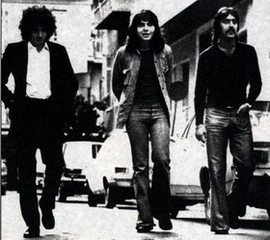
Freak Emporium in the UK had this to say:
” Amongst the most ambitious and best Greek progressive albums, this 1973 release is a tremendous concoction of dynamic and effortlessly shifting complex rhythm changes, multi-instrumental layers and musical textures. With individual segments ranging from Garcia-like guitar, pomp chuch organ, jazz, baroque, piano recital, thundering drums, soaring melodic vocals... And probably a kitchen sink, it is somewhat comparable with the finest ELP, Gentle Giant and Zappa, but at the same time totally unique! A mega prog killer!!”
…while Dutch prog specialists Hemispheres stumbled through this pretty lofty praise:
” The album that outshone all others in 1973(A huge call, but this album has attracted this sort of praise from MANY other prog fanatics, and reviewers.), was without any doubt the only one by AKRITAS, which moves within an unpredictable experimental progressive direction. The many elements from the Greek traditional folk music, especially in guitar playing, the unusual and excellent compositions, and the intense improvisation put the record in the first line of importance.(They’re not wrong there!) The principal composer of the group was Stavros Logaridis while the few lyrics were signed by the director Kostas Ferris, who had also written the lyrics for Aphrodite’s Child’s “666” concept double album.
The Akritas line-up was
Giorgos Tsoupakis - drums,
Stavros Logaridis - vocal, bass, acoustic guitar,
Aris Tasoulis - piano, organ, VSC 3 synthesizer,
and Dimos Papachristou - electric guitar”
…and our Crohinga Well buddies expounded thus:
” Akritas must surely rank among the best groups ever to have hit the Greek scene, if one is to judge by their - admittedly very rare - eponymous debut album. The LP is chock-full of underground progressive rock akin to the sounds that can be found on albums by Aardvark, Arcadium and even Emerson Lake & Palmer. Apart from Logarides, other people in the band were keyboards player Aris Tasoulis (ex-Despina Glezou), guitarist Dimis Papachristou, drummer Giorgos Tsoupakis (who in the eighties went on to play with Panos Dracos) and organist John Papadopoulos). Sadly, apart from a single, this 1973 release was to be their only re-corded output, for soon after this excellent band split up due to general indifference. A part of that era's rock press is on record as describing Akritas' music as "music for Chinese people", because of the intrinsically difficult and complex rhythmic patterns they wove.”
A mega prog killer!!
Second Hand - 1971 - Death May Be Your Santa Claus
Second Hand have been described as 'cult psychedelic heroes'; I can't find out anything about the core members before the band's formation, but keys man Ken Elliott and drummer Kieran O'Connor kept the band alive through several years and three albums, although the last of these, Chillum, was released under that name, for reasons now lost in the mists of time.
1968's Reality (Second Hand Reality, I suppose), is a typical late-ish period psych album, with all the usual influences, including the music-hall of Denis James The Clown and the rather overwrought balladry of The Bath Song (which reminds me of Simon Dupree, for some reason), amongst others. The album appears to be as good as dedicated to a gentleman by the name of Denis James (a friend? A fictional character?), with no fewer than three songs referencing him, including the sad tale of his untimely passing. Elliott gets plenty of MkII 'Tron onto the album, with flutes, strings and brass on opener A Fairy Tale, fairly heavy string use on Steam Tugs and a very upfront flute melody on Denis James (Ode To D.J.), distinctly different to the real flute to be heard in places. More strings and flutes in The Bath Song, including a 'Psycho'-style discordant string chord at one point, and finally more strings in the closing A Fairy Tale, a heavily-rearranged version of the album's opener. All in all, this is an excellent, rather overlooked psych gem from an undeservedly obscure outfit, with plenty of 'Tron to boot.
It took the band another three years to come up with the strangely-titled Death May Be Your Santa Claus, by which time, of course, the world (music and otherwise) had moved on noticeably. Second Hand's answer to this was to produce an odd little album of shortish material, not exactly psych, or prog, or mainstream pop/rock; not exactly anything, really, and all the better for it if you ask me. Saying that, it's not that fantastic an album, but it definitely has its moments (Revelations stands out particularly), despite being slightly uncohesive. I've no idea if Elliott had a new M400, or whether the old MkII was still in use, but he gets some strings in on all the highlighted tracks above, with some excellent pitchbend work on Hangin' On An Eyelid, and an odd, choppy flute part on Death May Be Your Santa Claus (Reprise), along with some brass (so is that the MkII?). Unfortunately, the two bonus tracks Elliott (presumably) has elected to add to the disc are largely a waste of time, and to add insult to injury, are stuck in the middle of the running order, rather than at the end, where you'd expect, and could easily flick the 'off' switch.
After splitting up acrimoniously after the Chillum album, Elliott and O'Connor eventually got back together as Seventh Wave, recording another two albums with minor 'Tron action in the mid-'70s before a final parting of the ways. Sadly, O'Connor has subsequently died, but Elliott continues to work in the business, playing sessions, as he did in the early' 70s. So; Reality is probably the better of the two albums, although if late-'60s psych isn't your bag, you're not going to like it, simple as that. Death May Be Your Santa Claus is odder, and possibly more adventurous, though I suspect it'll take rather more work to get into. Better 'Tron on the former than the latter, but not bad throughout.
GET IT
Demis Roussos - 1971 - On The Greek Side Of My Mind
Tracks:
- On the Greek Side of My Mind
- She Came Up from the North
- Good Days Have Gone
- We Shall Dance
- I Know I'll Do It Again
- Fire and Ice
- End of the Line
- My Blue Ship's A-Sailin'
- Mountains Beyond
- O My Friends You've Been Untrue to Me
- Lord of the Flies
- Without You
The Roussos had been in Egypt for two generations and on 15 June 1946 Artemios Venturis Roussos was born in Alexandria. His mother, Olga, and his father, George, both of Greek extraction, had also been born in the country their parents had come to in the 1920s. Following the Greek custom, the baby was named after his paternal grandfather, Demis being a pet name for Artemios. In the heart of an orthodox community, he lived in the middle of a Muslim city. From his early childhood he was immersed in folk music, exposed to Byzantine and Arabic influences. Attracted to singing, he joined the choir of the Greek Byzantine Church with which he sang for five years as a soloist. At the same time he studied musical theory and learnt how to play the guitar and the trumpet. Everything was going well when the Suez crisis blew up in 1961. Residents in Egypt had to leave the country and the Roussos – Mr Roussos was an engineer with a property construction company – returned to their native land, Greece. At the age of 17, with only music in his head and to the great disappointment of his mother who was hoping to send him to the best school in Athens, Demis formed his first band, ‘The Idols’, in which he played guitar and bass. At that time the band members were his cousin Jo, Natis Lalaitis, Nikos Tsiloyan and Anthony. A chance happening meant that one day Demis had to replace the group’s singer for a short time and he sang an Afro-American spiritual, ‘The house of the rising sun’, and another popular success of the time, ‘When a man loves a woman’. The public was immediately won over by his voice. Overcome by a great desire for independence, he began to feel the need to take control of his own life. Henceforth, bands and clubs became part of his daily life. Meeting Lucas Sideras and Argyris Koulouris lead him to play the international successes of the moment in clubs and night- clubs. The great turning point of his musical career was his meeting with Vangelis Papathanassiou in the summer of 1966. One particular song introduced Vangelis to Demis’ unique voice. Within his group he began to sing more and more often, frequently as a soloist. However, a few meetings with Vangelis did take place. These young musicians, cut off from the international music scene, soon realised that an interesting career could only be accomplished outside their country.
Demis left his group and began to practice new songs with Vangelis. At the end of March 1968, Lucas and Demis took the train to London. Vangelis was supposed to join them a few days later. Fate decided otherwise. When they arrived in Dover, at the English border, with no work permits, customs officers discovered photos and tapes in their luggage and quickly realised what their true intentions were. The young musicians cut short their journey. Back in Paris, trapped by the circumstances, their savings melted away day by day. Unable to leave Paris where unrest was brewing, only a recording could get them out of a tight spot. They learnt that Phonogram was holding an international conference and, plucking up all the courage they could find, they went to meet with the executives and explained their situation. A draconian contract, which promised exclusivity for six years, was drawn up. Confronted by the necessity to get by, they signed the contract and were able to begin recording. Their dream was at last coming true. It was in the 4m² cellar near the Porte d’Italie where they practised that ‘Rain and tears’, composed by Vangelis, was born. The lyrics were written by Boris Bergman, a young song-write introduced to them by the record company. The recording of the single took place in extremis in rather unusual circumstances. The following day the studio closed due to the general strike. A few weeks later ‘Rain and Tears’ was number one in the charts. They had made a hit! They themselves saw very little difference in what they were doing but they began to receive proposals for concerts and they were swept up in success. In June a week of performing at Olympia as Sylvie Vartan’s opening act was a real success. They spent the summer in the clubs of the South of France. Their success continued to grow. Hundreds of thousands of copies of their first album were sold and Demis’ fantastic voice brought them a great many more successes with ‘It’s five o’clock’, ‘I want to live’, ‘End of the world’ and ‘Spring, summer, winter and fall’. These five hit singles were accompanied by two albums, one of which became number one. The group climbed to number one in Germany, Holland, Belgium, France and Italy… ‘Aphrodite’s Child’ lasted for two years. They made 239 television appearances over this period. Demis married Monique with whom he had a daughter, Emilie. Vangelis however was dissatisfied. He wanted a more serious music, more like the music he composed alone. He wished to confront the English and American markets, to stop touring and devote his time to studio work. The recording of the double album ‘666’, based on the texts of Saint John’s Apocalypse, was the materialisation of this desire for change. It was a critical moment for the group: after three months of costly recording, the record company panicked. The break-up of the group became inevitable after a heated argument between Vangelis and Lucas. In the end it was Vangelis alone who, one year later, finished the album which was seen at the time as a classical masterpiece. Supported by the record company Phonogram, Demis began a solo career.
Inspired by the numerous folk themes in his head and using the sounds and instruments of pop music Demis fulfilled his dream. Two months in the studio were required to complete this first LP. He composed some of the melodies and conceived some of the arrangements. Named ‘Fire and Ice’, love, life and death are its major components. This twelve track album was released in 1971. Demis was already no longer totally unknown, his first single, ‘We shall dance’, having been one of the biggest hits of summer 1971 not only in France, but all over Europe. His international career took off straightaway. 1972 was a year of travelling. Spain, Italy, the Netherlands, Greece and Germany welcomed him. In June ‘My Reason’ was released and for several weeks Demis was once again at the top of the singles’ charts in France. In September he achieved national consecration with a performance at Olympia that revealed his talent. His vocal potential was fantastic and his stage presence extraordinary. In front of 30 000 people he performed ‘Velvet Morning’, a song composed specially for the occasion by Lakis Vlavianos, a Greek born in Athens on 7 July 1947. He composed most of Demis’ songs, ‘My friend the wind’, ‘Someday, somewhere’… Accompanist and conductor, he played the organ, Melotron and Moog Synthesizer. A trip to South America lead to a big tour in 1973, the year which saw the release of his second album, ‘Forever and ever’ comprising songs that would nearly all become great hits just like ‘Forever and ever’, ‘My friend the wind’, ‘Lovely sunny days’, ‘My reason’, ‘When I was a kid’, ‘Goodbye my love, goodbye’… Two million records had already been sold in one year of solo career and the Demis Roussos phenomenon was only just beginning. That year I heard a lot about him on the radio and I often listened to old Aphrodite’s Child records and to my great surprise I learnt that he was going to give a recital in my home town as the opening act for Joe Dassin. That was my first meeting with Demis. Until then I had never seen him on stage but he was in my imagination, omnipresent, all-powerful. His entrance was announced by an instrumental from his orchestra, a mixture of Wagnerian and Byzantine music added to by an impressive sound system. Demis appeared on stage. His stature was impressive, his long tousled beard flowing like a prophet’s, lightning in his eyes, his smile confident and satisfied. Demis, the Pope of pop, with the physique, the majestic gestures, the lofty allure, appeared shrouded in a cloud of smoke. That night he mixed a harmonious cocktail of both Greek and Byzantine music with sublime nuances. Steeped in this music, the public was captivated by his technical perfection. Demis Roussos had a musical style without improvisation, full of finesse and beauty. On stage the colours were perfectly matched to the music: tender, gentle, nothing aggressive. One of the songs, the unknown ‘Thousand years of wondering’, lasted six minutes. Composed by Lakis Vlavianos, it fluctuated between Bach, Led Zeppelin and the Yardbirds. This fantastic recital ended with a journey through Greece with ‘My reason’. His music moved the public, stirring in peoples’ hearts the strange charm procured by religious chants and the aggressive rhythm of Arabic chants. People let themselves be overcome by his extraordinary voice.
Really amazing voice !!
In Future we are gonna upload the first two marvellous albums of Aphrodite's Child that that constituting from more well international psychedelic records of 60's !!
grab and enjoy it !!!
Magical Power Mako (Japan) - 1975 - Super Record
1. Andromeda
2. Tundra
3. Silk Road
4. Woman in South Island
5. Pink Butch (Lalala)
6. Sound 3
7. Rock Baby in Meadow
8. Sound 3
9. Majorica Resistance Song
10. Sound 3
11. Cosmos Sandglass
12. Sound 3
13. Sound, Mother Earth
14. Sound 3
amazingly dusted psych LPs for the Japanese Polydor label in the 70s,
sometimes referred to in terms of "the Japanese Faust". His first 2 records
in particular, the Magical Power debut from 1973 & Super Record from 1975
are as excellent as it gets.
Realized in Mako's private studio on a quadraphonic tape machine, the eccentric
multi-instrumentalist created the definitive document of mid-'70s far
eastern rock exploration.
Mako was born in Shuzeni Izu in Japan in 1956, and after commencing his musical education at a young age, making his first public performance in 1973 at the age of 16 with his band genge in the famous Shibuya club.
Based on these impressive public performances, the precocious Mako was invited to play with one of Japan's foremost contemporary composers, Toru Takemistu, playing alongside the composer in 3 film scores, inheritance for the future, petrified forest and himiko. The response to his performances was overwhelmingly enthusiastic, elevating Mako to almost god-like status in his native country.
Mako's music has often baffled pundits keen to place him in a particular musical slot.
As one perplexed scribe opined "Mako's music possesses a certain strange kind of texture.
It is certainly what they call rock, but contains elements we can't describe so succinctly.
It clearly goes beyond the various genres of music and while full of them all, it sends forth a fierce glow".
Another critic wrote "adding to the variety of folk music from India, Turkey and Russia, his mandolin or taisho koto, and especially his marvellously-performed guitar, expresses fully the odour of the soil and mankind's universality".
Kaleidoscope (USA) - Pulsating Dream 1967-1970
 Kaleidoscope (USA) - Pulsating Dream [3cd's] (1967-1970)
Kaleidoscope (USA) - Pulsating Dream [3cd's] (1967-1970)Jimmy Page himself calls Kaleidoscope “my favorite band of all time,” and no wonder—with the multi-instrumental wizardry of David Lindley leading the way, Kaleidoscope weaved ethnic music exotica into rock songs better than anybody before or since (including Led Zep—where do you think they got the idea for 'Kashmir'?!). This 3-CD set presents their COMPLETE recordings, including all four albums—'Side Trips, Beacon from Mars, Incredible Kaleidoscope' and 'Bernice'—they recorded for Epic, plus a bunch of hard-to-find singles and B-sides. 45 mind-and string-bending tracks!
Song's Titles
Disc: 1
01. Egyptian Garden
02. If the Night
03. Hesitation Blues
04. Please
05. Keep Your Mind Open
06. Pulsating Dream
07. Oh Death
08. Come on In
09. Why Try
10. Minnie the Moocher
11. Elevator Man
12. Little Orphan Nannie
13. I Found Out
14. Greenwood Sidee
15. Life Will Pass You By
16. Taxim
17. Baldhead End of a Broom
18. Louisiana Man
19. You Don't Love Me
Disc: 2
01. Beacon from Mars
02. Rampι, Rampι
03. Nobody
04. Love Games
05. Egyptian Candy
06. Hello, Trouble
07. Just a Taste
08. Lie to Me
09. Let the Good Love Flow
10. Killing Floor (AKA Tempe Arizona)
11. Petit Fleur
12. Banjo
13. Cuckoo
14. Seven-Ate Sweet
Disc: 3
01. Sefan
02. Chocolate Whale
03. Another Lover
04. Sneakin' Thru the Ghetto
05. To Know Is Not to Be
06. Lulu Arfin Nanny
07. Lie and Hide
08. Ballad of Tommy Udo
09. Bernice
10. Soft and Easy
11. New Blue Ooze
12. Why Try [Single Version]
1967-1970
It's a little surprising that a cult band like Kaleidoscope would get honored with an all-out three-CD set, considering the limited market. But here it is, and it certainly leaves no stone unturned, including the entire recorded output of the band while they were on Epic. That essentially covers the entire period of interest to most fans, spanning the band's formation to their breakup in the early '70s (though they subsequently reunited for some albums that aren't represented here). In addition to everything from their albums Side Trips, A Beacon from Mars, Incredible, and Bernice, it has quite a few tracks that only showed up on non-LP singles or as outtakes on posthumous compilations. And some of those extras aren't even easily found on Kaleidoscope compilations, namely the old-timey psychedelia of the early B-side "Little Orphan Nannie" and the less impressive, heavily bluesy 1968 B-side "Just a Taste." The problem with this compilation is not so much to do with the music as whether it might be suitable for either the completist or neophyte. The completist might well already have virtually all of this on the albums and scattered comps, and resent having to fork out for a three-CD set just to get those two B-sides; the neophyte might find it way too much to start (and end) with, both in length and expense. But — if you want the complete works of Kaleidoscope in their first and best incarnation, it's all here, down to the crazy psychedelic soul single they did with Larry Williams and Johnny "Guitar" Watson, "Nobody." It's also well annotated, and contains plenty of exhilarating psychedelic world fusion highs, though the band's incredibly eclectic scope means there are some turkeys as well. Plus, some of those non-LP items aren't mere frivolities — the B-side "Rampe, Rampe," for instance, is a superb Greek-like instrumental that winds itself up into a frenzy.~AMG
Part 1 Part 2 Part 3 Part 4
Monday, August 14, 2006
Orient Express - 1969 - Orient Express
Loads of exotic instruments including lashings of oud and clay drum percussion. A trippy mixture of European rock and Middle Eastern promise.
Real Trippy Album!
My fave track from this album is ''Cobra Fever''
(Do you agree ?)
Stongly recommended !
Members of Orient Express are:
GUY DURIS sitar, electric oud, vocals
BRUNO GIET electric minitar, vocals
FARSHID GOLESORKHI electric melodica, dumbek, tympani, vcls
This act should not be confused with Liz Damon's Orient Express, who were from Hawaii and played cabaret music. They issued one album Liz Damon And The Orient Express (Anthem) 1970, and at least three singles.
The Peep Show - Maze 1967-1968
Personnel incl:
PATRICK BURSTON
45s:
1 Mazy/Your Servant, Steven (Polydor BM 56196) 1967
2 Esprit De Corps/Mino In A Mix-Up (Polydor BM 52226)
1968
This obscure London-based four-piece group is best remembered for Mazy, a dreamy, rather haunting slice of flower power. Apparently, their 45s were jointly produced by Peter Meadon, who'd helped mould The Who in their early days as The High Numbers, and Norman Jopling, who worked at 'Record Mirror'. Your Servent, Steven was also recorded by The Blues Magoos.
Compilation coverage has included:
Mazy on Rubble Vol. 13: Freakbeat Fantoms (LP), Rubble Vol. 7 (CD),
Visions Of The Past, Vol. 2 (LP & CD),
We Can Fly (CD)
and The Best Of Rubble Collection Vol. 1 (CD).
Tracks :
01 - Your Servant Stephen
02 - Maze
03 - Big Giant Man
04 - Lost My Lover
05 - Lovey Dovey Feeling
06 - Silver Queen Of The Screen
07 - When You're Getting Tired
08 - Rum Sensation
09 - Called And Chosen
10 - Esprit De Corps
11 - The Hovercraft Song
12 - Goodbye Child
13 - Morning
14 - Do Not Wait For Better Times
15 - Maze # 2
16 - My Friends And I
Tenth Planet TP043
GET IT
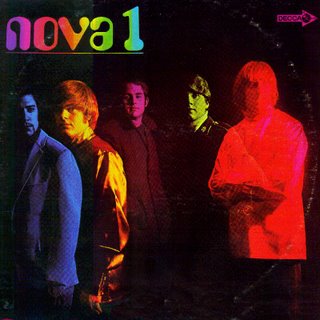
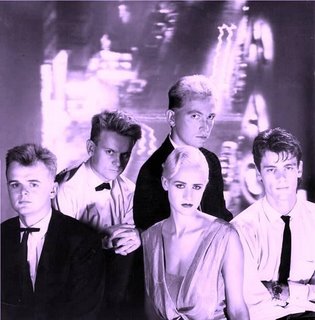
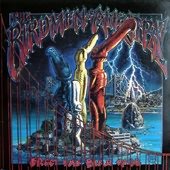







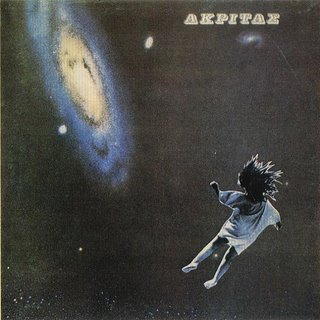

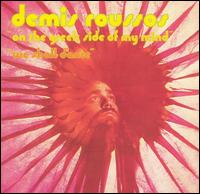
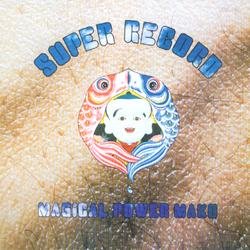

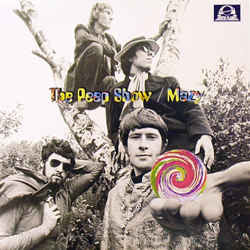
No comments:
Post a Comment